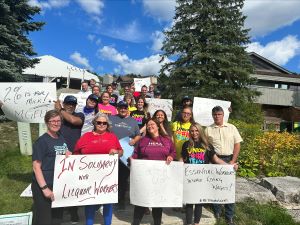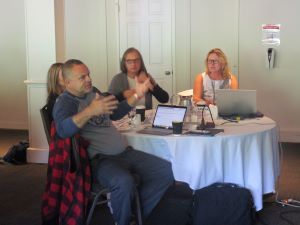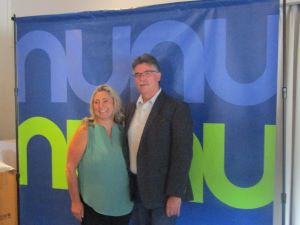August 25 2023
Barrie (24 Aug. 2023) ― For a week, participants at the National Union’s 24th annual Leadership Development School looked at the changing conditions the labour movement faces and how we respond.
“In our day-to-day jobs, we often are so busy dealing with urgent problems that we don’t have time to look at major issues facing our unions or how we can use new tools to respond to the challenges we face,” said Bert Blundon, NUPGE President. “Our Leadership Development School provides a people with the opportunity to explore important issues facing our movement.”
Participants made use of formal and informal learning opportunities
Participants came from across Canada and from the American and Irish labour movements.
There were 18 in-class sessions. These included the core curriculum, dealing with leadership, strategic planning and organizational change. Participants were also learning from each other during informal discussions.
Below: Participants showing solidarity for striking MGEU/NUPGE members; Members engaging in group discussion; Bert Blundon, NUPGE President with Laura Walton, CUPE President, Local 1022



Sessions looked at changing conditions workers and unions face
The conditions that workers and unions in Canada are facing have been changing dramatically. Several sessions looked at the changing economic and political environments and how these affect the gains workers can hope to achieve through their unions.
Participants discussed how public support for unions is higher than it has been in many years and that union members expectations and willingness to fight have also increased. Disenchantment with years of cuts and growing inequality provides an opportunity to push for change at the political level, but there is also a danger that people will turn to the far right if they don’t see solutions that meet their needs. There was also discussion of what the labour movement can do so that workers don’t lose opportunities to make gains.
Making sure no one is left behind
There were also sessions to help participants deal with major issues like racism that can result in some members being left behind and that can undermine union solidarity.
The discussion about how to make sure that no one is left behind extended to discussions of how we take action on climate change and union governance. A presentation on tax fairness looked at the role the tax system should play in ensuring that it is those who can afford to do so who are paying for the cost of climate action. And while another presentation looked at what needs to be part of Just Transition if it is actually going to meet the needs of workers. The discussion of good governance included the need to ensure that board solidarity doesn’t prevent problems like systematic racism from being addressed.
